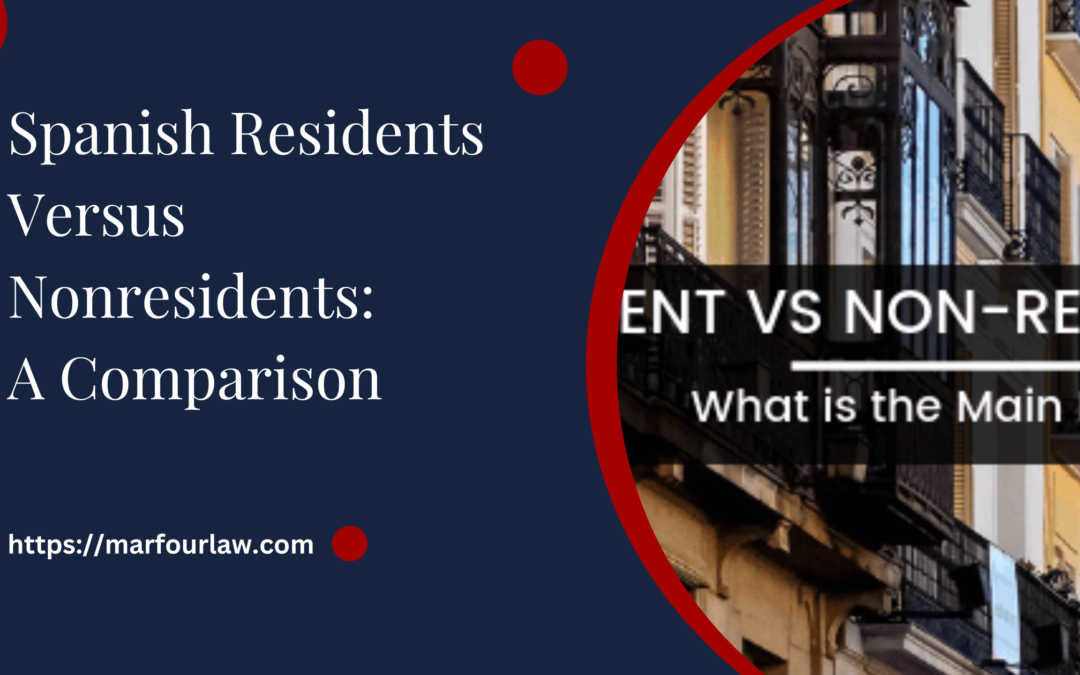Do you need clarification about whether you are a Spanish Residents Versus Nonresidents? Understanding the difference is vital because it affects your obligations within the country.
However, determining whether you fall into one category or the other can sometimes be unclear, particularly due to misconceptions surrounding tax and immigration residency.
This article aims to clarify what residency means for foreigners in Spain and its implications. By the end, you’ll have a comprehensive understanding of the criteria for residency status and its significance. So stay tuned!
Differentiating Tax Residency from Spanish Residency
Understanding the big difference between tax residency and regular Spanish residency is important. What does it mean to be a Spanish resident? Simply put, it means having permission to live in Spain. If you plan to move to Spain for the long term to work, you’ll need this residency permit.
On the other hand, being a tax resident means paying taxes like someone living in Spain. Many people make a common mistake: thinking that spending the first three months in Spain automatically makes them a resident. That’s not true. Being a resident usually means spending more than 183 days in Spain yearly, but it only sometimes requires a residency permit.
You could have permission to live in Spain without paying taxes as a resident. In the next sections, we’ll explain these terms more clearly and discuss what you must do.
Acquiring Residency in Spain
Imagine you’re a non-European Union citizen planning to visit Spain, whether to kickstart the visa or residence permit application process within the country or explore potential future property acquisitions. In such cases, you’ll require a tourist visa.
This visa grants you a stay of up to 3 months in Spain, as 90 days mark the legal maximum duration for nonresidents.
You must return to your home country once this period expires, and you have yet to secure any other applicable visas available in Spain (such as a student or entrepreneur visa).
However, if you obtain another visa within three months, you can apply for a residence permit, effectively obtaining Spanish residency.
Alternatively, you can kickstart the Spanish residency process from your home country. If you opt out of applying for a tourist visa, you’ll typically receive a one-year visa that permits travel to Spain. Once in Spain, you’ll need to apply for an official residency card to extend your stay and formalize your Spanish residency status.

Permissible Actions under Spanish Residency
For most permits and visas, Spanish residency serves as permission to reside and work in Spain. It validates your presence in the country, ensuring you’re not in an illegal situation. However, it’s essential to note that possessing Spanish residency does not inherently give you tax residency status.
Defining Residents in Spain
This is where you’ll gain insight into the true essence of being classified as a resident or nonresident in Spain, and it is all about taxation. In Spain, you are considered a tax resident if you spend more than 183 days (6 months) per year in the country.
Conversely, spending fewer than 183 days in Spain categorizes you as a non-tax resident. In many instances, the term “nonresident” specifically denotes “non-tax resident” status.
This scenario often arises with the golden visa program. One can obtain a residence permit by investing half a million euros in Spanish real estate.
However, to renew this visa, one is not required to spend more than six months in the country; it suffices to visit Spain once a year and maintain ownership of the property. In essence, you are not required to become a tax resident to retain the golden visa, which allows you to continue paying nonresident taxes.
Duration of Stay in Spain for Nonresidents
Typically, non-fiscal residents can reside in Spain for up to 183 days. If your stay exceeds this limit, you must pay resident taxes. However, as previously mentioned, there are exceptions where you may opt to pay nonresident taxes even if your stay surpasses 183 days, such as under the Beckham Law.
Additionally, it’s important to note that you can visit Spain without a residence permit for up to 90 days. Any stay beyond this duration requires obtaining Spanish residency, which would result in an unlawful situation.
Does Holding a Student Visa Make Me a Resident?
You are considered a fiscal resident if you hold a student visa and spend more than 183 days per year in the country. However, you are only required to pay taxes if you are employed or own property. If you transition from a student visa to employment, you are ineligible to apply for the Beckham Law due to your prior residency status in Spain.
The student visa differs from typical residence permits in terms of Spanish residency. It permits living in the country for educational purposes rather than authorizing residence and work. Therefore, regarding eligibility for Spanish nationality, the number of years spent on a student visa is half.

How does the status of a resident differ from that of a nonresident?
Now, let’s discuss a crucial aspect: what sets apart a tax resident from a non-tax resident? As a resident in Spain, you’re obligated to pay taxes at resident rates. For instance, residents must pay income tax on all their worldwide income, regardless of their country of origin.
On the other hand, nonresidents in Spain have a different tax obligation. They’re only required to pay income tax on their income within Spain, subject to a flat rate of 24% with no available deductions.
It’s worth noting that the specific tax rates vary for each type of tax, and circumstances may differ. In some cases, such as inheritance tax, residents and nonresidents are subject to the same taxation rules.
Furthermore, there are scenarios where individuals can spend more than 183 days in Spain while maintaining nonresident status. One way to achieve this is by applying for the Beckham Law.
Under this law, eligible individuals who haven’t resided in Spain in the past five years and are relocating for work purposes can opt to pay income tax as nonresidents for six years.
This entails being taxed at a flat rate of 24% instead of the progressive rate of up to 46%. Additionally, nonresident tax can apply in Spain with the digital nomad visa, provided the individual is employed by a company outside of Spain rather than self-employed.
Are Tax Declarations Required for Residents and Non-Fiscal Residents in Spain?
Certainly, both residents and nonresidents are required to file tax declarations in Spain. However, the process could be simpler for residents.
This complexity arises not only from the need for residents to account for their worldwide income and assets but also due to the diverse sources of income covered under income tax, such as salaries, pensions, capital gains from dividends, rental income, and proceeds from asset sales.
Both residents and nonresidents must register with the Spanish Tax Agency to fulfill their legal obligations. Failure to do so can result in significant financial penalties.
Moreover, the timing of tax filing varies for fiscal residents and nonresidents. Additionally, residents are obliged to submit Form 720, which entails declaring all assets owned worldwide.
FAQs
Here are some important FAQs:
1. What defines residency status in Spain?
Residency status in Spain is typically determined by the time an individual spends there. Generally, individuals who spend more than 183 days in Spain within a calendar year are considered residents for tax purposes.
2. How does residency status affect taxation in Spain?
Residents in Spain are subject to worldwide income taxation, meaning they must report and pay taxes on income earned both within Spain and abroad. Nonresidents, on the other hand, are generally only taxed on income earned within Spain.
3. What are the requirements for becoming a resident in Spain?
To become a resident in Spain, individuals typically need to demonstrate their intention to stay there for more than 183 days in a calendar year. They may also require proof of financial means and secure appropriate residency permits.
4. Are there different rights and benefits for residents versus nonresidents in Spain?
Yes, residents of Spain typically have access to certain rights and benefits that nonresidents may not, such as public healthcare, education, and social services.
5. Do residents and nonresidents have different healthcare access in Spain?
Yes, residents in Spain have access to the public healthcare system, while nonresidents may need to rely on private health insurance or pay out-of-pocket for medical services.
Conclusion – Spanish Residents Versus Nonresidents:
Hence, the distinction between residents and nonresidents in Spain has significant implications across various aspects of life. Residents, defined by spending more than 183 days within the country in a calendar year, enjoy access to multiple benefits, including public healthcare, education, and social services.
They are subject to worldwide income taxation, reporting, and paying taxes on income earned both within Spain and abroad. On the other hand, nonresidents are typically taxed only on income earned within Spain and may face limitations in accessing certain services such as public healthcare and education.
While residents and nonresidents can own property in Spain, residency status may affect tax obligations and other considerations. We hope now you are clear about resident vs nonresident status in Spain.

